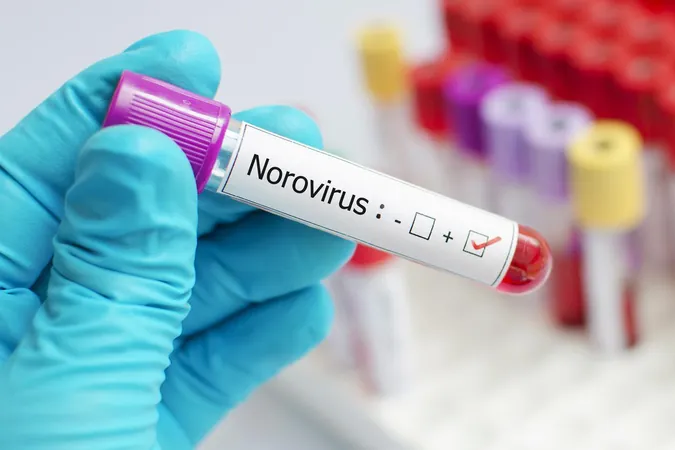
Is a Norovirus Vaccine on the Horizon? Discover the Latest Breakthroughs!
2025-08-24
Author: Rajesh
Norovirus, infamously known as the "winter vomiting bug" or the "cruise ship virus," holds the title of the leading cause of acute gastroenteritis outbreaks globally. This nasty virus accounts for approximately one in five gastro cases each year, affecting individuals from all walks of life, but especially young children, the elderly, and those with weakened immune systems.
It’s a staggering fact that norovirus infections result in about 220,000 deaths worldwide annually and impose a heavy economic burden due to healthcare costs and lost productivity.
Why No Vaccine Yet?
Despite the existence of vaccines for many other viruses, including COVID-19, why doesn’t a norovirus vaccine exist yet? The answer lies in the virus's complicated evolution. Norovirus, similar to the flu, is constantly undergoing genetic changes, which makes it challenging for our immune system to recognize and combat it effectively after previous infections.
To complicate matters further, there are at least 49 different genotypes of norovirus, creating a complex immune response that is typically short-lived and specific only to that particular strain.
Glimmers of Hope for Vaccine Development
Encouragingly, research into norovirus vaccines is gaining momentum. A promising approach involves virus-like particle (VLP) vaccines. These synthetic particles mimic the virus's natural structure, prompting an immune response akin to a real norovirus infection—minus the miserable symptoms!
One specific bivalent VLP vaccine has navigated through multiple clinical trials, showing some effectiveness against moderate to severe gastroenteritis in healthy adults. However, a recent phase two trial aimed at infants ended up being a disappointment, showing only a 5% efficacy.
On a brighter note, another phase two trial of an oral norovirus vaccine showed that it successfully decreased the likelihood of norovirus infection by 30%. This intriguing oral vaccine utilizes a modified adenovirus to deliver the relevant genetic material directly to the intestine, effectively kicking the immune system into gear.
The Future is mRNA?
With the success of mRNA technology during the COVID pandemic, scientists are also eyeing this platform for norovirus. Moderna is already working on an mRNA vaccine aimed at priming the immune system with norovirus VLPs, which could allow for quick adaptations to match ever-evolving strains.
Researchers are even exploring the potential of targeting just the norovirus 'spikes'—critical structures that assist in viral infection—to create another type of vaccine.
Natural Solutions on the Horizon
In addition to vaccines, some researchers are investigating natural compounds that might possess antiviral properties against norovirus, such as simple lemon juice and oligosaccharides found in breast milk. These promising candidates could eventually evolve into a preventative pill.
What Lies Ahead?
Despite exciting advancements, a norovirus vaccine is still at least three years away from hitting the market. A multitude of challenges remains, including the need for broad protection against diverse strains and comprehensive long-term studies to evaluate effectiveness and potential booster requirements.
Although often perceived as a minor inconvenience, norovirus can be debilitating and even deadly for the most vulnerable populations. The quest to develop a safe and effective vaccine is paramount in the realm of infectious disease prevention.
A licensed norovirus vaccine could significantly cut down absenteeism in schools and workplaces, reduce hospitalizations, and save lives, paving the way for a healthier future against viral gastroenteritis.




 Brasil (PT)
Brasil (PT)
 Canada (EN)
Canada (EN)
 Chile (ES)
Chile (ES)
 Česko (CS)
Česko (CS)
 대한민국 (KO)
대한민국 (KO)
 España (ES)
España (ES)
 France (FR)
France (FR)
 Hong Kong (EN)
Hong Kong (EN)
 Italia (IT)
Italia (IT)
 日本 (JA)
日本 (JA)
 Magyarország (HU)
Magyarország (HU)
 Norge (NO)
Norge (NO)
 Polska (PL)
Polska (PL)
 Schweiz (DE)
Schweiz (DE)
 Singapore (EN)
Singapore (EN)
 Sverige (SV)
Sverige (SV)
 Suomi (FI)
Suomi (FI)
 Türkiye (TR)
Türkiye (TR)
 الإمارات العربية المتحدة (AR)
الإمارات العربية المتحدة (AR)